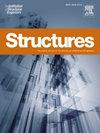采用自攻螺钉连接的冷弯方形管接头的拉伸性能
IF 3.9
2区 工程技术
Q1 ENGINEERING, CIVIL
引用次数: 0
摘要
通过实验和数值计算研究了冷弯方形管(CFST)螺纹连接的拉伸行为。通过外部钢板和内部钢管的自攻螺钉连接方管,并改变螺钉的数量,制作了十个试样。此外,还通过单次剪切试验获得了单螺杆连接的机械性能。实验结果表明,增加螺钉数量可提高试样的承载能力和刚度。螺钉的剪切破坏是主要的破坏模式。当两类试样的螺钉数量相同时,内管试样的拉伸性能优于外钢板试样。随后,开发了测试试样的有限元(FE)模型。在验证测试结果后,进行了广泛的参数研究,以进一步考察设计参数对 CFST 螺钉连接拉伸行为的影响。螺钉排列、钢板壁厚及其强度的变化对拉伸行为的影响很小,钢强度对拉伸行为的影响也很小,而螺钉的数量、间距和直径则是影响 CFST 螺钉连接拉伸行为的关键参数。根据试验结果和 FE 分析,对现有计算方法进行了修改,得到了 CFST 螺杆连接拉伸承载力的计算公式。与结果比较表明,该公式在确定 CFST 螺杆连接的拉伸承载力方面是保守和可靠的。本文章由计算机程序翻译,如有差异,请以英文原文为准。
Tension performance of joint made in cold-formed square tube with self-tapping screw connections
The tension behavior of cold-formed square tube (CFST) screw connections was investigated experimentally and numerically. Ten test specimens were fabricated from the square tubes connected by external steel plates and internal tube applying self-tapping screws such that the number of screws was varied. In addition, the mechanical properties of the single-screw connections were obtained through single shear tests. Experimental results revealed that an increase in the number of screws led to higher bearing capacity and stiffness in the specimens. Shear failure of the screws was observed as the primary failure mode. When the number of the screws was equal in both types of the specimens, those with the internal tube exhibited superior tensile behavior than the ones with external steel plates. Subsequently, finite element (FE) models of the test specimens were developed. Upon validation of the test results, an extensive parametric study was conducted to further examine the influence of the design parameters on the tensile behavior of the CFST screw connections. Variation of the arrangement of screws, wall thickness of steel plates and their strength had only a minor influence on the tension behavior, and steel strength had little influence on the tension behavior and the number, spacing, and diameter of the screws were the key parameters affecting the tension behavior of the CFST screw connections. Based on the test results and FE analyses, the existing calculation method was modified, and a formula for calculating the tensile bearing capacity of the CFST screw connections was obtained. Comparison with the results indicate that the formula was conservative and reliable for determining the tensile capacity of CFST screw connections.
求助全文
通过发布文献求助,成功后即可免费获取论文全文。
去求助
来源期刊

Structures
Engineering-Architecture
CiteScore
5.70
自引率
17.10%
发文量
1187
期刊介绍:
Structures aims to publish internationally-leading research across the full breadth of structural engineering. Papers for Structures are particularly welcome in which high-quality research will benefit from wide readership of academics and practitioners such that not only high citation rates but also tangible industrial-related pathways to impact are achieved.
 求助内容:
求助内容: 应助结果提醒方式:
应助结果提醒方式:


